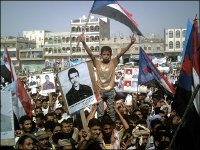{
"authors": [
"Christopher Boucek",
"Lizza Bomassi"
],
"type": "event",
"centerAffiliationAll": "",
"centers": [
"Carnegie Endowment for International Peace",
"Carnegie Europe",
"Malcolm H. Kerr Carnegie Middle East Center"
],
"collections": [
"Europe’s Southern Neighborhood"
],
"englishNewsletterAll": "",
"nonEnglishNewsletterAll": "",
"primaryCenter": "Carnegie Endowment for International Peace",
"programAffiliation": "",
"programs": [],
"projects": [],
"regions": [
"Yemen",
"Gulf",
"Middle East"
],
"topics": [
"Security"
]
}
The Resurgence of Al-Qaeda in the Arabian Peninsula
Thu, November 19th, 2009
Brussels
IMGXYZ1426IMGZYXYemen faces a great and growing number of challenges that endanger its political future and threaten its neighbors on the Arabian Peninsula. Economic ruin, an emerging water shortage, the depletion of oil reserves, violent extremism, and a growing secessionist movement all threaten to overwhelm the Yemeni government.
While Yemen has survived crises in the past, these complex and interwoven challenges are unprecedented in both degree and kind. They need to be addressed immediately, or there is a very real risk that the country will collapse, destabilizing its neighbors and the entire gulf region, and ultimately become a safe-haven from which al-Qaeda can regroup and launch attacks on domestic and international targets.
Carnegie’s Christopher Boucek came to Brussels to explain the security situation in Yemen and discuss the options available to the Yemeni government and the international community in their struggle to stabilize the country and prevent it from falling into the hands of extremists.
An International Priority
From a security standpoint, Yemen is recognized as a high priority in the West, comparable to Afghanistan and Pakistan. Boucek stressed, however, that the attention and resources dedicated to Yemen pales in comparison to those devoted to Afghanistan and Pakistan. Boucek commented that Yemen receives as little as 5% of the amount of funds that are given to the Pakistani government to help it fight terrorism.
When compared to other global concerns, such as Iran, North Korea, Afghanistan, Iraq, or the economic crisis, it is easy to see why Yemen is not treated with the same degree of urgency. Nonetheless, Boucek argued, the situation in Yemen is rapidly deteriorating in the face of several challenges, all of which have the potential to develop into a serious crisis within the next five years.
Economic Problems and Scarcity of Resources
All of Yemen’s problems boil down to economics. Economically, Yemen is an unviable country; it gets about 80% of its revenue from the sale of hydrocarbons, and its oil reserves are rapidly running dry. Moreover, the country has no serious proposals for finding economic alternatives.
The only thing currently holding the Yemeni government together is its ability to distribute the revenue it receives. As revenue falls, so will the government’s ability to maintain order and control. Moreover, inflation in Yemen is rampant; having reached a height of 20 percent earlier this year, it is currently at 12 percent. Similarly, unemployment is currently at 35 percent. Yemen is the second poorest country in the Arab world: the majority of its population survives on less than 2$ a day.
Compounding these growing economic disasters is that fact that the country is also rapidly running out of water. Sanaa will be the first capital in modern history to run dry, and throughout the country, water is being extracted far more rapidly than it can be replenished. Roughly 80 percent of conflicts in Yemen, Boucek concluded, come down to water.
Demographic and Human Security Problems
In about twenty years, the population of Yemen will double to approximately 40 million, and within three decades, the population will have tripled, reaching about 60 million. Yemen will not be able to educate or provide employment for its growing population, which will result in mass emigration.
Boucek stressed that security problems alone do not constitute the greatest threat to Yemen. Instead, economic, demographic and resource problems will combine to overwhelm the government. All of these problems are interconnected, he argued, feeding into feelings of high insecurity among the local population.
If security problems aren’t the chief threat to Yemen, they are still significant contributors to destabilization. Current security crises include:
- The Southern Secessionist Movement: Most of Yemen’s hydrocarbon reserves are located in the south. Residents there believe that the region is not receiving the benefits or wealth it should, and that the Republic Government in North Yemen has exported its tribal structures and its patronage and corruption networks to the south, locking out the southerners.
- The ongoing civil war in Saada: The civil war in Saada started roughly five years ago. Zaidi Muslim revivalists in the Northern Province of Saada felt that they weren’t receiving the aid and recognition they deserved from the government and that their liberty to practice their faith was being infringed upon. In August 2009, the conflict flared up again and is now spreading to other regions inside Yemen, and even to Saudi Arabia. This, Boucek said, is a major deterioration of the situation, as Saudi Arabia is the only the regional power that could possibly have been a mediator in this conflict.
- A resurgent al-Qaeda organization.
Al–Qaeda
Al–Qaeda, Boucek stressed, is not currently a priority for the Yemeni government. Unlike the Southern Successionist Movement and the civil war in Saada, al-Qaeda does not at the moment threaten the existence of the Yemeni regime.
There has, however, been a recent uptake in violence connected to al-Qaeda in Yemen. In January of this year, the Saudi and Yemeni affiliates of al-Qaeda merged to create the larger regional organization of al-Qaeda in the Arabian Peninsula. These militants are not necessarily focused on undermining Yemen, Boucek explained. Instead, their goal is to use Yemen as a base from which to attack Saudi Arabia. Al-Qaeda in the Arabian Peninsula, he explained, is an organization that aims to launch operations not just in Yemen, but throughout the region.
The Yemeni government is ill-equipped to deal with Al-Qaeda. Whereas the Saudi government has the resources and religious legitimacy to effectively drive a wedge between extremists and their population, the Yemeni government has neither
Boucek concluded by reflecting on impending release from Guantanamo Bay of approximately 95 Yemeni nationals. Many of these individuals, who could potentially have links to al-Qaeda in the Arabian Peninsula, may soon be repatriated to Yemen. Determining a successful way to deal with these returning Yemeni nationals, Boucek commented, will be critical to dealing with the future of al-Qaeda in the Arabian Peninsula.
Carnegie does not take institutional positions on public policy issues; the views represented herein are those of the author(s) and do not necessarily reflect the views of Carnegie, its staff, or its trustees.
Event Speakers
Boucek was an associate in the Carnegie Middle East Program where his research focused on security challenges in the Arabian Peninsula and Northern Africa.
Lizza Bomassi
Former Deputy Directory, Carnegie Europe

Lizza Bomassi was the deputy director of Carnegie Europe.
